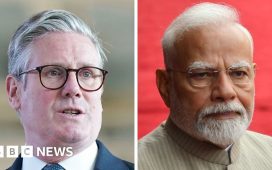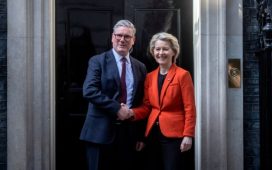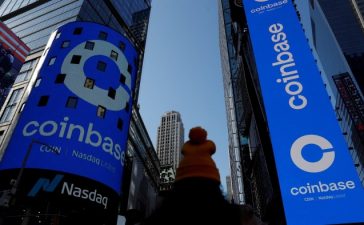Introduction: Bank of England setting interest rate today
Good morning, and welcome to our rolling coverage of business, the financial markets and the world economy.
With inflation worryingly high, and the banking system in turmoil, these are difficult times for central bankers.
And today, the Bank of England will reveal whether it had pushed up UK borrowing costs again, or left interest rates on hold at 4%.
Yesterday’s shock rise in UK inflation, to 10.4%, has left many investors expecting the BoE’s Monetary Policy Committee to lift Bank Rate by a quarter of one percent today, to 4.25%.
That would be the 11th interest rate increase in a row, extending a tightening cycle which began in December 2021.
But Bank policymakers may be wary of pushing interest rate higher, as the problems in the banking sector this month have shown that the impact of last year’s interest rate increases are being felt now.
The BoE could plum for a ‘dovish hike’ – lifting borrowing costs, while signalling that rates could be near their peak. But that would be more palatable if inflation wasn’t in double-digit levels.
Ellie Henderson, economist at Investec, explains:
When deciding the appropriate level of the Bank rate the MPC will have to assess which is the lesser of two evils: the risk of inflation being higher for longer or the current threat to financial stability stemming from the rapidly evolving fears of a banking crisis.
In an environment where inflation is reaccelerating, the question is whether the MPC will continue to raise interest rates or opt for a wait-and-see approach given the events that have unfolded over the past week or so.
Last night the US Federal Reserve lifted its key rate by a quarter-point, as America’s central bankers weighed up the worst banking crisis since 2008 and the highest inflation rate in a generation.
But, the Fed also indicated it was on the verge of pausing further increases in borrowing costs amid the recent turmoil in financial markets, although it does not expect to cut rates anytime soon.
Edward Park, chief investment officer at Brooks Macdonald, says setting monetary policy against a backdrop of market volatility and inflation uncertainty is “an unenviable task”.
There are two camps in the market – those who view the current risks to financial stability as an existential problem and those who consider sustained inflation as a greater evil. Fed Chair Powell had previously stated that the Fed was ‘prepared to increase the pace of rate hikes’ to tackle stickier inflation seen in the recent CPI release.
“The 25bp interest rate hike announced represents a middle ground between the hawkish and dovish camps. It acknowledges the stickiness of US inflation while being mindful of the macroeconomic risks posed by the banking sector. The equity markets initially reacted positively to the announcement, as it struck a balance between addressing investor concerns around banking contagion and indicating that the central bank is taking inflation levels seriously.
We also get interest rate decisions in Switzerland – where policymakers have been busy battling the banking crisis – and Norway.
The agenda
-
8.30am GMT: Swiss National Bank interest rate decision
-
9am GMT: Norges Bank interest rate decision
-
9.30am GMT: Realtime UK economic and business insight data
-
Noon: Bank of England interest rate decision
-
12.30pm GMT: US weekly jobless claims
-
3pm GMT: Eurozone flash reading of consumer confidence
Key events
Blog reader Charlie Lloyd has got in touch to warn that whatever the outcome of today’s BOE meeting, the trajectory of inflation is clear.
Charlie explains:
Monetary policy acts with long and variable lags and central banks are simply shooting in the dark at this point. Global credit conditions are set to tighten significantly in light of recent events, and commodity prices have fallen sharply.
Headline inflation, much like unemployment data, is a lagging indicator, and most forward looking indicators suggest inflation is set to fall considerably in the coming quarters. This has been corroborated by bond markets.
Central banks were too slow to tighten policy, and will inevitably over-tighten, as per previous rate hiking cycles. When the US data starts to turn, bond yields will fall very quickly (in my view!).
Kevin Barry QS is struck by Danny Blanchflower’s call for interest rates to be cut (see 9.30am post), sayingL
If Blanchflower predicted 2008 crash and sees correlations now, interest rate rises today are setting the scene for 2023 crash ! Depositors will panic and move to safe havens, under the bed…
Kevin G asks an excellent question – why does the Bank of England think raising interest rates will bring down inflation, given rising prices have been driven by energy costs and food?
To my understanding, this inflation is being caused by the high cost of gas and energy, the rising cost of food which is set by the supplier, basically things that are out of control of the regular people.
How is raising the interest rate going to cause the decrease in the things that are out of the control of the UK population?
We’ll find out the Bank’s thinking at noon – when it releases the minutes of this week’s meeting. Last month, though, the MPC pointed out that inflation expectations remained “elevated” – the theory is that hiking borrowing costs will persuade people that inflation will fall, making them less likely to push for inflation-matching pay rises.
The flaw in this logic, though, is that inflation is a measure of price rises, not wage increases, and companies have been successfully raising their prices, leading to worries about ‘greedflation’:
Message us your views
We’re testing a new feature in the blog today, which lets readers send through messages to us here at the Guardian.
They’re not public comments – only we will see your message, but I will monitor them and try to respond in the liveblog.
So you can let us know your views on today’s Bank of England interest rate decision, the cost of living crisis, the turmoil in the banking sector, or other business events in the news…
To try it, click the ‘Send us a message’ under my byline near the top of this blog. Thanks!
Small signs of positive improvement in UK business conditions
There are “small signs” of improvement in the UK economy, the Office for National Statistics reports this morning.
Its latest realtime data, assessing business conditions, shows “small signs of positive improvement for some measures”.
That would cheer the Bank of England, as it tries to cool inflation without sinking the economy.
The ONS warns, though, that its too early to know if this is the start of a longer-term change in conditions.
There’s been a fall in the number of businesses reporting lower turnover, and fewer companies say they have to pay more for their goods and services.
The ONS says:
In February 2023, a quarter (25%) of trading businesses reported their turnover was lower compared with January 2023, while 16% reported their turnover was higher; therefore, a net 9% of businesses reported their turnover decreased, this is up from a negative net position of 13% in January 2023.
More than one in five (22%) trading businesses expect turnover to increase in April 2023, while 12% of businesses expect turnover to decrease; the net 9% of businesses expecting turnover to increase is the highest net position since the question was first asked in April 2022.
More than a third (37%) of trading businesses reported an increase in the prices of goods or services bought in February 2023 compared with January 2023; this proportion has been falling since the first time the question was asked in March 2022 (50%).
62% of trading businesses said they had been affected in some way by price rises. The most reported effects were
▪️ absorbing costs (41%)
▪️ passing on price increases to customers (27%)
▪️ changing suppliers (12%)— Office for National Statistics (ONS) (@ONS) March 23, 2023
Bloomberg: breakfast price index reaches new high after UK food shortages

An index of breakfast ingredients has hit a new high, as food shortages drove up prices in the UK shops.
Bloomberg reports that the average cost of products to make a traditional fry-up rose by more than 22% from a year earlier in February.
It was the second straight month that the Breakfast Index increased by more than 20%, based on yesterday’s UK inflation report.
Bloomberg explains:
The price of a basket of English breakfast items soared past £35 as vegetable shortages in supermarkets fueled a surprise jump in UK inflation.
Tomato prices rose 6.4% in February compared with the previous month, the second-biggest riser in the latest Bloomberg Breakfast Index behind bread.
A supply crisis caused grocers such as Tesco Plc and J Sainsbury Plc to restrict sales of certain produce to three per person last month, while pictures on social media showed empty shelves across the country.
More here.
The UK stock market has dropped into the red this morning, ahead of the Bank of England’s decision on interest rates at noon.
The FTSE 100 index of blue-chip shares has shed 66 points, or 0.85%, to 7501 points, away from yesterday’s one-week high.
The stronger pound is weighing on exporters’ share prices.
Susannah Streeter, head of money and markets at Hargreaves Lansdown, says the Bank of England decision is in focus after last night’s Federal Reserve rate hikes, with banking nerves still on edge.
‘’With the banking sector not out of the woods and central bank and US treasury officials still on edge, uneasy about what may lie ahead, a sense of nervousness is still hanging over the markets. The FTSE 100 has opened in negative territory, following in Wall Street’s footsteps, with the S&P 500 closing sharply lower, as the Federal Reserve raised rates but signalled a pause was on the horizon given recent turmoil.
Because contagion has been contained, and inflation is still far too high, the Federal Reserve stuck to its plan and lifted rates by 0.25%.
Achieving price stability is still the top priority, given the pain high prices have been causing right through the economy.
Germany risks running out of gas next winter, warns regulator
Jillian Ambrose
Europe’s energy woes may drag on into next winter, according to Germany’s energy watchdog, our energy correspondent Jillian Ambrose writes.
Klaus Müller, the head of the Federal Network Agency, told the Financial Times that the “danger of a gas shortage is still there”, and warned that households and businesses will need to cut gas use further to avoid an energy crunch next winter.
Germany is a key gas trading hub within Europe, and in the past has acted as a conduit for gas imports from Russia to the rest of the continent through a network of gas pipelines.
Another winter of tight gas supplies and higher prices in the German gas market would likely lead to higher prices across Europe too.
The coming winter will be a key test for Germany, according to Müller, because it will be its first winter without any Russian pipeline gas imports. China’s economic recovery could stoke demand for gas on international markets leading to higher global prices too.
One former Bank of England policymaker argues that the BoE should slash interest rates at this week’s meeting, not hike.
David Blanchflower, a member of the Bank’s monetary policy committee during the global financial crisis of 2008, argues that UK official borrowing costs should be cut from 4% to 3% at this week’s meeting.
Blanchflower is also pushing for the Bank to stop its quantitative tightening (QT) programme, under which it is selling government bonds it bought since the 2008 financial crisis (under its quantitative easing, or QE, ringing).
Blanchflower, who pushed for interest rates to be cut ahead of the 2008 financial crisis. says:
“The Bank of England is showing signs of dangerous groupthink when it comes to QT, believing that it must reverse the previous policy of QE when they have not as yet offered any credible reason for doing so.”
So mpc members have ben raising rates to help banks but instead they destroyed them. Brilliant all in the name of slowing inflation but they failed at that too. Groupthink seems a bit of a problem what?
— Professor Danny Blanchflower economist & fisherman (@D_Blanchflower) March 20, 2023
Blanchflower, who has co-written a report on central bank policy with economist Richard Murphy, added:
“The Bank of England needs to stand back and reappraise its role on the economy. It could use QE over the next few years to be a powerful force for good for the people of the UK, transforming the mortgage, student loan and business investment markets, in the process using new funds created via QE.
We urge them to grab this opportunity instead of heading us towards almost inevitable recession or even depression, so severe could the impact of QT be.”
@D_Blanchflower and I have issued a press release on how we see the banking crisis developing. We think there is a very real contagion risk that central banks need to respond to very urgently with rate cuts over the next few days. The release is in the rest of this thread. pic.twitter.com/94rzM2annR
— Richard Murphy (@RichardJMurphy) March 20, 2023
However, a former BoE deputy governor, Sir Charlie Bean, predicts that the Monetary Policy Committee will lift Bank rate at noon today.
He told Radio 4’s Today Programme that Bank staff will be trying to unpick how much of the factors pushing up inflation are temporary and will unwind, and how much is permanent.
Bean doesn’t accept Blanchflower’s argument for a rate cut, though, saying:
Danny puts a pretty low weight on keeping inflation down, basically, and tends to take the view that we’re heading for disaster all the time.
Sometime’s you’re right. A stopped clock is right twice a day.
Of course, Blanchflower’s warnings of a looming recession 15 years ago were proved to be accurate, after he spent months voting, alone, for rate cuts. Then came the collapse of Lehman Brothers, and the rest of the MPC joined him….
We have another interest rate rise – this time in Norway.
The Norges Bank’s Monetary Policy and Financial Stability Committee has decided to raise the Norwegian policy rate from 2.75% to 3%, as it battles inflation.
That matches the European Central Bank’s deposit rate, which was raised to 3% last week.
Growth in the Norwegian economy is slowing, but economic activity remains high, the labour market is tight, and wage growth is on the rise, the Norges Bank says.
Governor Ida Wolden Bache flagged that another rate increase could come in May:
“There is considerable uncertainty about future economic developments, but if developments turn out as we now expect, the policy rate will be raised further in May.”
The BoE is almost certain to raise interest rates by 0.25 percentage points at noon today, predicts Professor Costas Milas of the Management School of University of Liverpool.
He points out that both the ECB and the Fed have hiked their policy rates already this month, with inflation in the US and the Eurozone being lower than the 10.4% inflation reading in the UK.
However, monetary policy should be forward looking rather than dependent on current inflation. I still believe that the “wait and see approach” is better than hiking now since inflation will fall rapidly.
Professor Milas has written a detailed discussion of the impact of raising interest rates during elevated financial stress (which is arguably the case today) here, in a blog on the LSE Business Review.
In it, he points out that rising financial stress will put downward pressure on prices and suppress GDP growth…… at a time when money growth in the UK economy has turned negative for the first time since the 2008 financial crisis.
Switzerland lifts interest rates to 1.5%

Switzerland’s central bank has hiked interest rates by half a percent.
The Swiss National Bank’s policy rate has been lifted to 1.5%, from 1%, to counter “the renewed increase in inflationary pressure”.
The SNB says it cannot rule additional rises in the SNB policy rate will be necessary to ensure price stability over the medium term.
The past week has been marked by the events surrounding Credit Suisse, the SNB acknowledges, adding:
The measures announced at the weekend by the federal government, FINMA and the SNB have put a halt to the crisis.
The SNB is providing large amounts of liquidity assistance in Swiss francs and foreign currencies. These loans are backed by collateral and subject to interest.
SNB:
-We cannot rule out additional rate increases in the near future
– sees 2023 Swiss growth at around 1% vs the December forecast for growth around 0.5%
-sees 2023 inflation at 2.6% (previous forecast was for 2.4%)— DailyFX Team Live (@DailyFXTeam) March 23, 2023
In the City, shares in sub-prime lender Amigo have plunged by 90% to almost zero after it revaled this morning that efforts to restructure its business have failed.
Amigo told shareholders this morning that it has struggled to raise new equity from investors. It has taken the ‘very difficult decision’ to stop lending with immediate effect and wind down its lending operation.
Danny Malone, Amigo’s chief executive officer, said.
“This is a very sad day for all our employees who have worked extremely hard to address historic lending issues and rebuild a new Amigo, and for our shareholders and wider stakeholders who have supported us.
It’s also a sad day for creditors due redress who will now receive a lower level of cash compensation than they would had the New Business Conditions been satisfied.
Amigo specialises in providing credit to borrowers typically excluded by mainstream banks.
Back in 2021, the company set aside £344m for customers who complained they were mis-sold loans that they could not afford, and launched its rescue plan to raise cash from investors – part of which could be used to pay off wronged customers.
An investigation from the City regulator found that Amigo had failed to assess properly whether customers, or their guarantors, could afford to repay loans they applied for. The company avoided a fine, though, arguing that this would have led to its collapse
Citigroup have downgraded Europe’s banking sector, warning the rapid pace of interest rate hikes will further weigh on economic activity and lenders’ profits.
The Wall Street brokerage cut its rating on European banks to “neutral” from overweight” in a note on Wednesday, saying the likely continued monetary policy tightening adds to worries stemming from the turmoil in the global banking sector.
The note says:
“The European banking sector’s fundamentals look healthy. But the ongoing confidence crisis could limit banks’ risk appetite and reduce the flow of credit.”
They, instead, prefer technology stocks.
Pound highest since early February
Sterling has touched its highest level since the start of February this morning, as the City anticipates another rise in UK interest rates at noon.
The pound reached $1.2343, up three-quarters of a cent, as the dollar slipped following last night’s Federal Reserve decision.
Although the Fed did lift US interest rates by a quarter-point, it also dropped its regular warnning that “ongoing increases” in Fed Funds rate would be needed.
“In other words, the Fed has toned down its statement to give it flexibility to pause the interest rate hiking cycle in May depending on incoming economic data,” says Matthew Weller, global head of research at FOREX.com and City Index.
Britain’s biggest banks under pressure to pass on higher interest rates to savers

Richard Partington
Britain’s biggest banks are under pressure to pass on higher interest rates to savers after figures showing they have made an extra £7bn by refusing to do so, my colleague Richard Partington writes.
On the day the Bank of England is expected to announce a further rise in interest rates, the Unite trade union said banks had already made billions of pounds in extra profit from the dramatic rise in borrowing costs.
Banks make money by charging higher interest on loans than deposits, using the central bank base rate as the reference point. However, the industry has come under fire from across the political spectrum for passing on the rise to borrowers amid the cost of living crisis at a faster rate than for savers.
Stepping up the pressure on the banking industry on Wednesday, the powerful Treasury committee of MPs said it was writing to the City watchdog, the Financial Conduct Authority, to suggest it should look at the issue.
Harriett Baldwin, the Conservative chair of the committee, said:
“While consumers should continue to shop around for the best rates, the information we’ve received from the UK’s biggest high street banks demonstrates there is much more that can be done.”
Barclays, HSBC, Lloyds Banking Group and NatWest Group were forced last month to defend rates of less than 1.3% on their easy-access savings accounts, despite the Bank of England base rate rising to 4%.
More here:
The Bank of England is caught between the threat of prolonged high inflation and the risk of “a continued slump in economic growth and/or a potential financial accident,” says Oliver Blackbourn, portfolio manager on the Multi-Asset team at Janus Henderson Investors.
Blackbourn adds:
Markets have been roiled recently by this final fear, with banks being wound up or merged in both the US and Europe.
The Bank of England will hope that it can avoid such a situation in the UK, but it needs to weigh this risk against the cost to the population of potentially prolonging the squeeze in the cost of living. The Bank needs to tread a very narrow path as increased borrowing costs really start to bite but inflation remains well above the 2% target rate. Its latest projections put inflation at 3.9% at the end of 2023 but 1.0% in the middle of 2024.
Being able to look through the current high level of inflation can only be deemed an appropriate reason not to raise interest rates significantly further if inflation can demonstrably be seen to be moderating. Today’s data will bring that into question.
Introduction: Bank of England setting interest rate today
Good morning, and welcome to our rolling coverage of business, the financial markets and the world economy.
With inflation worryingly high, and the banking system in turmoil, these are difficult times for central bankers.
And today, the Bank of England will reveal whether it had pushed up UK borrowing costs again, or left interest rates on hold at 4%.
Yesterday’s shock rise in UK inflation, to 10.4%, has left many investors expecting the BoE’s Monetary Policy Committee to lift Bank Rate by a quarter of one percent today, to 4.25%.
That would be the 11th interest rate increase in a row, extending a tightening cycle which began in December 2021.
But Bank policymakers may be wary of pushing interest rate higher, as the problems in the banking sector this month have shown that the impact of last year’s interest rate increases are being felt now.
The BoE could plum for a ‘dovish hike’ – lifting borrowing costs, while signalling that rates could be near their peak. But that would be more palatable if inflation wasn’t in double-digit levels.
Ellie Henderson, economist at Investec, explains:
When deciding the appropriate level of the Bank rate the MPC will have to assess which is the lesser of two evils: the risk of inflation being higher for longer or the current threat to financial stability stemming from the rapidly evolving fears of a banking crisis.
In an environment where inflation is reaccelerating, the question is whether the MPC will continue to raise interest rates or opt for a wait-and-see approach given the events that have unfolded over the past week or so.
Last night the US Federal Reserve lifted its key rate by a quarter-point, as America’s central bankers weighed up the worst banking crisis since 2008 and the highest inflation rate in a generation.
But, the Fed also indicated it was on the verge of pausing further increases in borrowing costs amid the recent turmoil in financial markets, although it does not expect to cut rates anytime soon.
Edward Park, chief investment officer at Brooks Macdonald, says setting monetary policy against a backdrop of market volatility and inflation uncertainty is “an unenviable task”.
There are two camps in the market – those who view the current risks to financial stability as an existential problem and those who consider sustained inflation as a greater evil. Fed Chair Powell had previously stated that the Fed was ‘prepared to increase the pace of rate hikes’ to tackle stickier inflation seen in the recent CPI release.
“The 25bp interest rate hike announced represents a middle ground between the hawkish and dovish camps. It acknowledges the stickiness of US inflation while being mindful of the macroeconomic risks posed by the banking sector. The equity markets initially reacted positively to the announcement, as it struck a balance between addressing investor concerns around banking contagion and indicating that the central bank is taking inflation levels seriously.
We also get interest rate decisions in Switzerland – where policymakers have been busy battling the banking crisis – and Norway.
The agenda
-
8.30am GMT: Swiss National Bank interest rate decision
-
9am GMT: Norges Bank interest rate decision
-
9.30am GMT: Realtime UK economic and business insight data
-
Noon: Bank of England interest rate decision
-
12.30pm GMT: US weekly jobless claims
-
3pm GMT: Eurozone flash reading of consumer confidence









